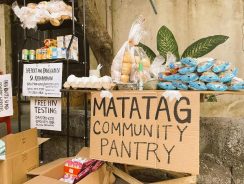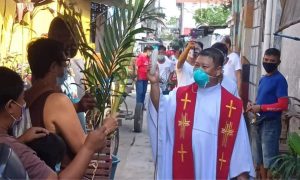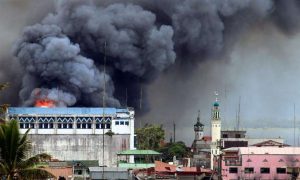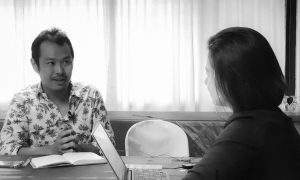On 12 March 2020 President Duterte announced the lockdown of Metro Manila. Lockdown has continued under general, modified or granular community quarantine ever since. COVID-19 has evolved from an unexpected shock into a slow-moving disaster.
Aside from contracting the virus itself hunger has been the number one concern for many families across the globe during the COVID-19 pandemic, not just because of the immediate impact of hunger, but also because of the long-term developmental affects on children. Historically the Philippines has seen a relatively high incidence of wasting, stunting and low weight in children in comparison to countries with a similar HDI ranking. In 2019 19% of children under five were undernourished, 28.8% were stunted and 5.8% were wasting, statistics that have seen scant improvement since the early 2000s. World Bank Human Capital Index figures from 2020 show that a Filipino child born in that year would only be 52% productive in their life time compared to a child with a ‘complete’ education and ‘full’ health. This figure fell from 55% in 2018. Stunting is used as a marker for impaired productivity as it corresponds to “poor cognition and educational performance, low adult wages […] and lost productivity”. Good nutrition during the “First Thousand Days of Life” from the start of pregnancy to a child’s second birthday is critical to avoiding irreversible stunting.
Effects on productivity impact upon the family in relation to medical costs and the burden of care, and also reduced household income, throughout the life of the child. Impacted productivity also affects the state as it results in additional costs in education and health and a loss of productivity in the workforce. Save the Children estimated that childhood stunting cost the Philippines 326.5 billion PhP, or 3% of GDP, in lost workforce productivity in 2013. Although COVID-19 is not a virus that is associated with high rates of death in children and young people the knock-on effects of maternal and childhood hunger, the scale of which is still unclear, could well be significant. Many urban poor children, unable to attend school because of lockdown restrictions, are in danger of being “invisible” as they are the children of informal workers, undocumented street dwellers or from families with extra-judicial killings (EJK) victims. This serves to blur the scale of the problem.
At the time of writing the Philippines has recorded more than 2.79 million cases of COVID-19 and more than 43 thousand deaths since the pandemic started. There have been more than 849 thousand cases recorded in Metro Manila and more than 10.2 thousand deaths. Metro Manila has the highest population density in the world, with more than three million informal settlers in Metro. COVID-19 is a “crowd disease” and chaotic megacities such as Manila, Jakarta and New Delhi provide ideal conditions for it to thrive.
As part of a project on the impact of COVID-19 on women and girls in urban communities in the Metro Manila we recently ran a series of around 40 semi-structured interviews with public servants, community leaders and NGO workers operating in urban poor communities. Thus far 80% of our interviewees have spoken to us on condition of anonymity. Many of the interviewees were active in, or had responsibility for, communities that had been affected by EJK as a result of President Duterte’s so called “War on Drugs”. We documented their experiences working with communities that were amongst the most marginalised in the Metro Manila. In every interview we conducted food security was identified as the most pressing issue.
Many people residing in Metro Manila urban poor communities are informal workers with no protection from labour regulations. 2017 ILO figures show that 49% of workers in the Philippines were self-employed, with a further 11% being unpaid family workers. These workers rely on daily wage, own-account working or informal contracts of employment. Such urban workers are typically jeepney or pedicab drivers, street vendors or construction workers. The precarious nature of their employment meant that their household budget was immediately impacted upon lockdown. Our findings tally with data from the Asian Development Bank, that found that 85% of households in the Philippines experienced financial difficulty during the pandemic and Social Weather Stations that reported an annual average of 21.1% of survey respondents experiencing moderate or severe hunger in 2020.
Our interview evidence indicated that payments from the government Social Amelioration Programme (SAP) for low-income families had been slow in coming, only partly disbursed or impossible to access. It was generally reported that government food packs were inadequate, scarce or substandard in quality and quantity. It was also frequently reported that local government-controlled lists that regulated access to aid were out of date (with renters and incoming residents unable to access packs, and the deceased or departed still featuring on lists). In an interview for this project City of Manila Mayor, Isko Moreno, stated that there was an urgent need for accurate data to facilitate policy planning. At the start of the pandemic Manila City Hall estimated that residents numbered 350,000 families, in fact there were 690,000. He also noted that budgets had to be rapidly realigned as they had been approved pre-pandemic.
Interviewees in Quezon City reported that homeless people were unable to access government aid and were often chased off the street during lockdown by the police. It was left to NGOs and faith-based organisations to locate the families living, for example, under bridges and to bring supplies such as food and sanitation packs.
Families that had been the subject of an EJK killing were usually initially reluctant to make themselves visible in the community for fear of further attacks. Often it was the victim that had been the primary family breadwinner. COVID-19 compounded the problems faced by these already traumatised families. Our interviews revealed that it was NGOs, such as Rise Up for Rights and Life and PhilRights, and faith based organisations such as the Arnold Jannsen Kalinga Foundation , that identified and documented the families that were “left behind” after an EJK. These groups also provided material aid, such as medical and food packs, and legal, social and spiritual support.
It was also reported that those not politically aligned with, or not friendly with those in control of the lists, failed to register for government aid. To counter such abuses Mayor Isko Moreno set up a daily Facebook live reporting system that gave a direct channel for residents to report abuses or indicate that they had not received assistance. Rogue barangay captains were called in the Mayor’s office for what he called a “reasonable conversation”.
Our interview evidence revealed that community pantries, community gardens, community feeding programs and non-governmental initiatives to procure, pack and distribute food packs and hot meals kept families sustained during the pandemic. Community gardens, an initiative that has received support from Quezon City Mayor Joy Belmonte, were also regarded as a source of emotional wellbeing at a time when social activities were severely curtailed. Community workers also reported efforts to procure goods directly from farmers and fishers who no longer had access to their regular markets and suffered from repressive travel restrictions. Goods were bought for “at the gate” prices, transport was organised or donated, and goods were distributed in the city. This served the dual purpose of providing a market for rural producers and feeding the urban population.
Our evidence indicates that residents were consulted and active in these activities when they were run by non-governmental organisations, but they were not consulted in relation to government-run activities. For instance, Rise up for Life and Rights relied on a group they called the “core mothers” (of EJK victims) to determine who should be first in line to receive available aid. This approach is significant as it was the vulnerable group themselves who helped organise the allocation of aid. This approach circumvented the use of out-dated, manipulated or overwhelmed government lists.
One interviewee noted that “red tagging” was a threat to their activities and the militarisation of lockdowns led to heightened anxiety, especially amongst those already affected by EJKs. One interviewee told us that the security forces were seen as “a sign of death, whilst medics were seen as a sign of life”, therefore it was unsettling to see a lot of uniforms in the communities. However, in one case the Jesuit affiliated initiatives of the Ateneo de Manila University, Tanging Yaman Foundation and Simbahang Lingkod ng Bayan were assisted by the Philippine Navy, the Armed Forces of the Philippines, the Air Force and the Philippine National Police to pack and distribute food packs. This joint venture stemmed from their earlier cooperation when the Taal Volcano erupted in January 2020 and reflects the “social” revolution of military affairs towards humanitarian work. During the COVID-19 relief efforts a conscious decision was made by the military to use female-headed distribution teams in the communities. Another interviewee from the Sampaloc area of Manila noted that the military and police were active in distribution efforts in her area. However, the general feeling in the community was that the military was “kinder and more more respectful” than the police.
...creating spaces for civil society should be integral to post-pandemic recovery and reconstruction plans.
Protests and Pandemics: Civil Society Mobilisation in Thailand and the Philippines
Specific programs were set up to feed children including hot meals. In some cases local women regularly cooked meals for hundreds of children. The fast food chain Jollibee was also cited as regularly donating hot meals for children. Interviewees reported that recipients of food packs would often split packs with friends and neighbours who had not been allocated anything. None of our interviewees made reference to the government-run School Based Feeding Programme and follow up queries indicated that the program had either not been active in their communities or had ceased. The City of Manila started a three month feeding programme for children in October 2020, initially for three months, this was subsequently extended to six months with a budget of two million dollars. It was clear from our interview that Mayor Moreno was aware of the future impact of stunting in young children. The Department of Education claims to have reached 3.5 million beneficiaries nationwide in 2020/21. However, questions need to be asked about gaps in this coverage.
The Philippines Sustainable Development Report for 2021 indicates that “major challenges remain” for the country if it is to achieve SDG 2 Zero Hunger by 2030. Using data from 2018, the report shows that the prevalence of stunting and wasting in children have “stagnating scores or that improvement is less than 50% of the required rate”, while the prevalence of undernourishment shows “moderate improvement that is insufficient to achieve the Goal”. The government-run Rapid Nutrition Assessment Survey held in December 2020 recorded 62.1% of 5,943 households across the Philippines experiencing moderate or severe hunger. It is therefore reasonable to surmise that COVID-19 has inevitably had a detrimental effect on the “First Thousand Days of Life” for thousands of Filipino babies, and older children. The effect of this on future productivity for the state and individuals remains to be seen.
The Philippine government should reboot its efforts to get nutritious food into the mouths of those that need it most. This could be done by the following: consulting with established religious and community groups to identify those most in need and to avoid reliance on unreliable “official” lists; establish a permanent scheme that supports community gardens for the urban poor; make efforts to support informal workers, renters or the homeless to ensure that they are accounted for during the distribution of aid and support during future disasters. This is important as, according to the United Nations, the Philippines is the fourth most disaster-prone country globally, having suffered from 304 disasters over the last two decades. More disasters are sure to follow. The government should stop “red tagging” community pantry organisers and follow the lead of the Tanging Yaman Foundation collaboration with security forces. Security forces can be used for COVID-19 humanitarian work in the same way that they are after environmental disasters. This would help “soften” the “policing” approach to COVID-19 that has alienated some communities and rendered the most vulnerable of the urban poor immobile and hungry in their homes.
 Facebook
Facebook  Twitter
Twitter  Soundcloud
Soundcloud  Youtube
Youtube  Rss
Rss 



